
Shobha Gurtu (1925–2004) was an Indian singer in the light Hindustani classical style. Though she had equal command over pure classical style, it was with light classical music that she received her fame, and in time came to be known as the Thumri Queen, and for the 'Abhinaya' sung in her full-throated voice. She was awarded the Padma Bhushan in 2002.
In Hindustani music, a gharānā is a system of social organisation in the Indian subcontinent, linking musicians or dancers by lineage or apprenticeship, and more importantly by adherence to a particular musical style.
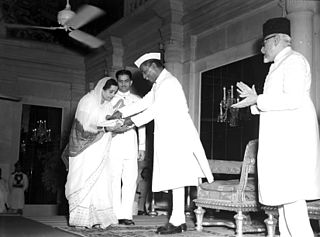
Kesarbai Kerkar was an Indian classical vocalist of the Jaipur-Atrauli gharana. A protege of Ustad Alladiya Khan (1855–1946), the founder of the gharana, from age sixteen, she went on to become one of the most noted khayal singers of the second half of the 20th century.
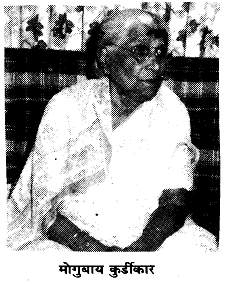
"Gaan Tapasvini" Mogubai Kurdikar was a renowned Indian classical vocalist of the Jaipur-Atrauli gharana. She was known for being a leading student of Alladiya Khan and the guru and mother of Kishori Amonkar, the most popular Hindustani classical female vocalist of the 20th Century.

Prabha Atre was an Indian classical vocalist from the Kirana gharana. She was awarded all three of the Padma Awards by the Government of India. She died after experiencing breathing difficulty in the early hours and was taken to Dinanath Mangeshkar Hospital. She died from cardiac arrest before reaching the hospital. Atre died on 13 January 2024, at the age of 91.

Ganesh Balawant Nawathe, better known as Pandit Jitendra Abhisheki, was an Indian vocalist, composer and scholar of Indian classical, semi-classical, and devotional music. While he distinguished himself in Hindustani music, he is also credited for the revival of the Marathi musical theatre in the 1960s. Abhisheki has been praised as being among the stalwarts of Hindustani classical music who mastered other musical forms such as thumri, tappa, bhajan, and bhavgeet. His work in Marathi natyasangeet is well-known.

Arati Ankalikar Tikekar is an Indian classical vocalist and playback singer, in Marathi, Konkani and Hindi film industry. She known for singing in Agra, Gwalior and Jaipur-Atrauli gharana style of Hindustani classical music. She has received National Film Awards twice for Best Female Playback Singer and has been awarded the Sangeet Natak Akademi Award in 2020.
The Jaipur-Atrauli Gharana is a Hindustani music apprenticeship fraternity (gharana), founded by Alladiya Khan in the late-19th century. Evolved from the dhrupad tradition of the Atrauli and Dagarbani lineages, but known for khayal, this gharana is known for producing acclaimed musicians like Kishori Amonkar, Kesarbai Kerkar, Laxmibai Jadhav, Mogubai Kurdikar, Mallikarjun Mansur, Shruti Sadolikar, Dhondutai Kulkarni, and Ashwini Bhide-Deshpande. Consequently, this gharana developed a reputation for its distinctive vocal aesthetics, raga repertoire, and technical aptitude.
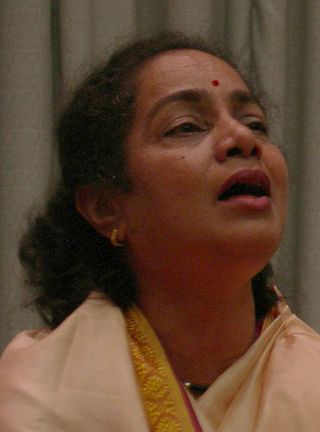
Shruti Sadolikar Katkar is an Indian classical singer of the khyal style in the Jaipur-Atrauli gharana. She is a recipient of the Sangeet Natak Akademi Award for Hindustani vocal music for 2011.
Dhondutai Kulkarni, was an Indian classical singer from the Jaipur-Atrauli gharana. She was the last legendary exponent of orthodox Jaipur-Atrauli Gharana.

Mahesh Kale is an Indian Classical vocalist and playback singer renowned for his specialization in Indian Classical (Hindustani), Semi-Classical, Devotional music including Natya Sangeet. Mahesh Kale won the 63rd National Film Award as the Best Playback Singer, for the song Aruni Kirani in the film Katyar Kaljat Ghusli. He is a disciple of Pandit Jitendra Abhisheki. He was ranked nineteenth in The Times of India's Top 20 Most Desirable Men of Maharashtra in 2017. He was also a prominent singer of the Agra Gharana. However he never believed in rigid compartments of Sangeet Gharanas. He was also influenced by the style of Jaipur Gharana. There was an unusual conjunction of various gharanas of Indian Classical Music in Pandit Abhisheki Ji as it was evolved after deep thinking.

Pandit Biswajit Roy Chowdhury is a Hindustani classical musician and a renowned sarod player from India.
Ramchandra Purushottam Marathe, also known as Pandit Ram Marathe, was a Marathi music director, singer, and actor on stage and in films. As a child actor, he performed the title role of Krishna in Prabhat Film Company's 1938 film, Gopal Krishna. He was disciple of Vilayat Hussain Khan, the maestro of Agra gharana of Hindustani classical music., Master Krishnarao Phulambrikar and others. Through Master krishnarao, he developed his Khayal style which had elements of different gharanas such as Jaipur, Gwalior and Agra.
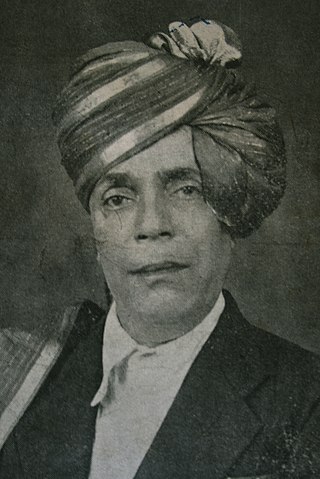
Vishwanath Jadhav was an Indian classical khyal singer and a disciple of Abdul Karim Khan, the founder of Kirana gharana.

Shanno Khurana is an Indian classical vocalist and composer, from the Rampur-Sahaswan gharana of Hindustani classical music. A disciple of the doyen of the gharana, Ustad Mushtaq Hussain Khan, she is known for performing rare bandish and raag, though her singing style includes genres like khayal, tarana, thumri, dadra, tappa, to chaiti and bhajan. Born and brought up in Jodhpur, she started singing on All India Radio in 1945 in Lahore, later shifted to Delhi, where she continued her singing on All India Radio, Delhi and in concerts and music festivals. She also pursued music education, finally earning her M.Phil. and PhD in music from the Kairagarh University, and has undertakes extensive research on folk music of Rajasthan.
Rohini Bhate was among the senior most Kathak dance exponents in India, who developed as a performer, teacher, writer, researcher and critic this Indian classical dance. During her career, she was awarded with several recognitions, such as the Sangeet Natak Akademi Award, and the Kalidas Samman.
Geetika Varde Qureshi is an Indian classical vocalist of the Jaipur-Atrauli gharana of Hindustani classical music and wife of percussionist Taufiq Qureshi.

Vidushi Sumitra Guha is an Indian classical vocalist, known for her expertise in the Carnatic and Hindustani schools of classical music. The Government of India honored her in 2010, with the fourth highest civilian award of Padma Shri and in 2020 with a Sangeet Natak Akademi award.
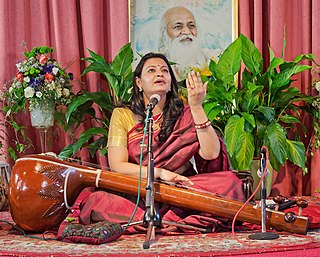
Meeta Pandit is a Hindustani Classical vocalist and a leading exponent of the Gwalior Gharana. She is the granddaughter and disciple of Krishnarao Shankar Pandit and daughter of Laxman Krishnarao Pandit. She is the sixth in the unbroken lineage and the first woman in the family to have taken up music as a profession.

Gauri Pathare is an Indian musician and a winner of the All India Radio competition.













